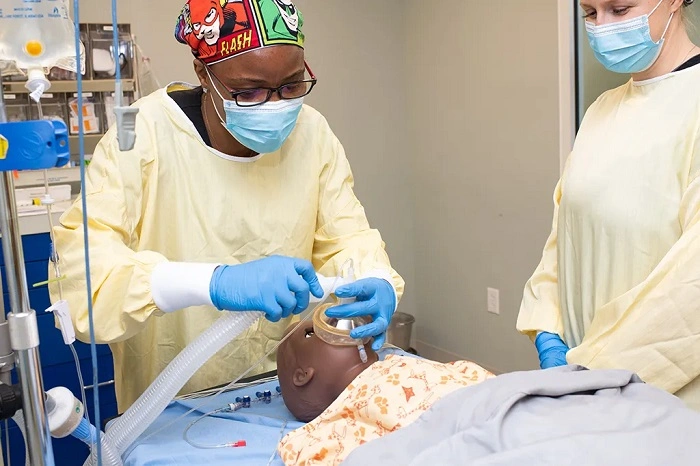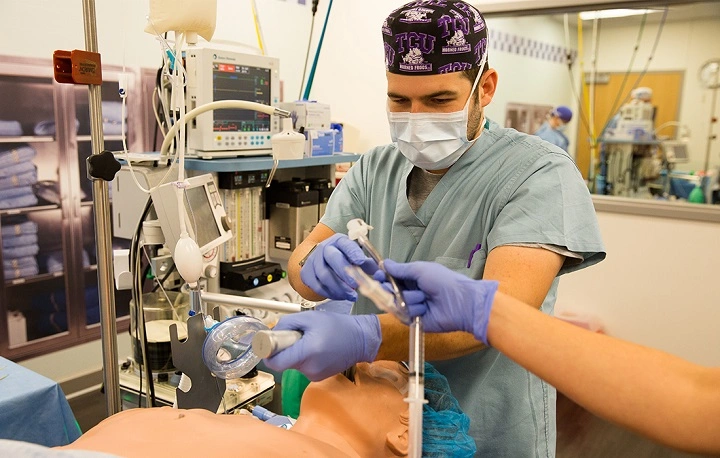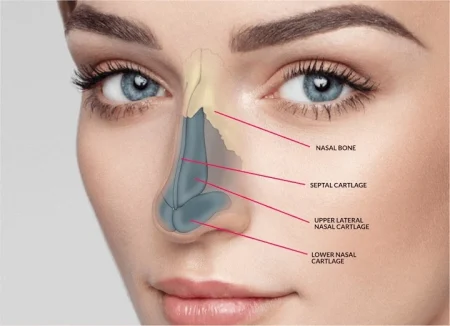Nursing is a highly valued field across the globe, and the most professional employees are the CRNAs among nurses. CRNA stands for Certified Registered Nurse Anesthetist. CRNA nurses provide anesthesia to the patients prior to surgery, in course of surgery, or for certain surgical procedures. They also monitor patients under close observation to ensure their safety.
But to be a CRNA, you need to undergo very specialized courses and programs. Most CRNA courses are more complex, more sophisticated, and prepare you for very serious duties. If you ever wondered about what CRNA courses are, how one becomes a CRNA, or how challenging they are, this blog has you sorted in simple terms.
We’ll talk about requirements, what you learn, how long, how much, and what your life is like in school.
What are CRNA Courses?

CRNA courses are master’s level nursing courses that get you ready to practice as a nurse anesthetist. They’re not nurse basics courses. Instead, they are graduate courses after your nursing degree and in-patient experience.
CRNA programs are offered either in a Doctor of Nursing Practice (DNP) or a Doctor of Nurse Anesthesia Practice (DNAP). CRNA programs used to be master’s level but now they must be doctoral level.
The courses include:
- Advanced anatomy and physiology
- Pharmacology (drugs, especially anesthesia drugs)
- Anesthesia chemistry
- Anesthesia for complex surgery
- Monitoring and patient safety
- Advanced pathophysiology (how disease impacts the body)
- Research, leadership, and healthcare systems
The programs include practice clinics and class work, i.e., you practice in real hospitals with real patients.
Requirements Prior to Joining CRNA Classes
You do not join CRNA classes immediately. You have to meet some requirements first. Common requirements are:
- Bachelor of Science in Nursing (BSN): You must have a BSN degree or equivalent.
- Registered Nurse (RN) License: You must be an RN with a current U.S. license.
- Work Experience: All the schools demand 1–2 years of unbroken full-time experience as a critical care nurse, ideally ICU.
- Good GPA: Most of the schools demand at least a GPA of 3.0, but high performers’ scores are better.
- GRE (optional): Some of the schools demand Graduate Record Exam (GRE) scores. Some no longer do, though.
- Strong Recommendations: Supervisor, professor, or physician recommendations who know your performance are necessary.
They need these because CRNA school is tough as nails and demands a solid background in patient care.
How Long Are CRNA Programs?
CRNA programs are typically 3 years full time.
- Year one is typically in school: advanced science, pharmacology, and anesthesia principles.
- Years two and three are clinical rotations in the hospital. You work on the patients’ hands-on, supervised, and learn very quickly how to administer anesthesia for any type of surgery and procedure.
Others are a bit longer, based on the school and part-time or full-time.
What CRNA Classes Cover
CRNA schools are very thorough. Some of the most important ones are:
Advanced Anatomy and Physiology
You study the human body extensively. How the heart, lungs, brain, and nervous system work because anesthesia affects all of them.
Anesthetic Drug Pharmacology
All the anesthetics drugs: administration route and time, right dosage, side effects, and emergency procedures.
Chemistry and Biochemistry
You are aware of how drugs chemically interact with the body.
Pathophysiology
Knowing how illness distorts the body means that you can provide safe anesthesia to patients with all kinds of diseases.
Principles and Practice of Anesthesia
This is a great deal of the CRNA course work. You study anesthesia practice for all types of surgery—orthopedic, cardiac, pediatric, obstetric, and emergency.
Pain Management
CRNAs administer pain to the patient, so you study more complex pain management.
Research and Evidence-Based Practice
You also learn to read and research. CRNAs are the best of the best, so you must be able to use research so that patient care can be enhanced.
Leadership and Healthcare Policy
These are the classes that prepare you to be a leader in hospital, surgical center, and even rural health center positions.
Clinical Training in CRNA Courses

CRNA school is not in the classroom and textbook. Clinical is best. You’re instructed directly by anesthesiologists and CRNAs for thousands of hours in hospital and surgery center settings.
In clinicals, you will:
- Administer anesthesia on real surgeries (with the guidance of your preceptor).
- Intubate patients and secure the airway.
- Monitor patients’ vital signs and keep them stable.
- Handle anesthesia emergencies.
- Be trained in every kind of different setting: trauma centers, pain clinics, ORs, and obstetric wards.
Once you graduate from training in a safe environment, you’ll become a certified CRNA worthy of caring for patients under anesthesia.
Cost of CRNA Programs
CRNA school is not cheap because not only are they long and demanding, but afterward clinical rotations ensue.
- Tuitions: $60,000–$150,000 average total cost for the entire program.
- Book and supply charges: $2,000–$5,000.
- Living expenses: Because you’re attending school full time, the majority of students won’t really be going to be able to do much of anything else for employment throughout the program, so you’ll need to have living expenses put away.
Financing assistance, grants, and loans are typically available. Most CRNAs believe that the cost is well worth it because CRNAs earn some of the highest nursing salaries—usually in the $180,000–$220,000 annually range.
Limitations and Benefits of CRNA Programs
Benefits
- Fair salary and good job placement.
- A lot of respect in the medical field.
- Independence to practice in the majority of states.
- Diversity in practice settings (hospitals, surgery centers, rural clinics).
- Assisting patients during pivotal moments of their lives.
Disadvantages
- Awful stress and competitive classes.
- Very expensive tuition.
- Long clinic and study hours.
- Patient life responsibility is overwhelming.
Success Strategies with CRNA Programs
- Start out strong in nursing school. Good GPA.
- Gain ICU experience. Get work in intensive care units post BSN.
- Develop time management. CRNA school will be challenging; self-discipline will be needed.
- Take care of yourself. Stress gets overwhelming, so keep well-being, relaxation, and studying well.
- Network. Meet with other nurses, CRNAs, and instructors—these people could be your role models.
Life After CRNA Classes
You must take the National Certification Examination (NCE) following CRNA school in order to be certified CRNA. With CRNA certification, you can work in:
- Hospitals (operating rooms, emergency, intensive care)
- Outpatient surgery centers
- Pain management clinics
- Military medicine
- Rural hospitals where CRNAs typically work independently
CRNAs work across the nation, especially in rural settings where anesthesiologists are not welcome.
Frequently Asked Questions
How many years does it take to be a CRNA?
Typically 7–10 years total: BSN (4), ICU experience (1–2), CRNA program (3).
Is CRNA school difficult?
Yes, one of the more challenging nursing programs. But with self-discipline and studiousness, many do.
Do CRNAs make more money than physicians?
Some CRNAs make more than family practice physicians but typically less than specialists.
Can CRNAs practice independently?
Yes, most states have CRNAs practice independently. They must practice under the supervision of anesthesiologists in other states.
Is it worth taking CRNA classes?
Yes. CRNAs earn decent pay, enjoy job security, and can truly impact patient care.
CRNA school is one of the most challenging and rewarding nursing schools to attend in the US. It involves years of education, complete commitment, and the capability to bear accountability for an enormous amount of responsibilities. But you are rewarded with a well-paying, highly-respected career where you save lives every day.
If you have an interest in anesthesia, patient safety, and advanced practice nursing, CRNA school could be your best bet.








